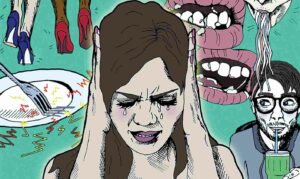If you are one of the millions of people who suffer from ADHD, you may also be struggling with misophonia. Misophonia is a condition that causes intense emotional reactions to certain sounds. For people with ADHD, this can be especially difficult, as many common coping strategies for misophonia don’t work well when you have ADHD. In this blog post, we will discuss some tips for coping with misophonia when you have ADHD.
Contents
Understanding Misophonia ADHD

Misophonia is a condition that is often associated with people who have ADHD. This is because the two conditions tend to go hand in hand, as many people with ADHD are hypersensitive and more easily triggered by certain sounds or sensory stimuli than those without ADHD.
Misophonia is a condition that can be particularly challenging for people with ADHD, as it often makes it difficult to focus and manage your emotions in response to certain sounds.
Is Misophonia Linked to ADHD?
Individuals who have ADHD frequently struggle with Sensory Triggers, which is a sensitivity to external stimuli such as sights, odors, and sounds. Everything becomes a distraction when they are unable to filter and control their responses to incoming information.
Many people with ADHD struggle with misophonia, a condition that makes certain sounds especially triggering and upsetting. For those living with both conditions, managing misophonia can be an ongoing challenge.
There is some evidence to suggest that there may be a link between misophonia and ADHD. In one study, researchers found that people with ADHD reported higher rates of misophonia than those without ADHD. Additionally, there seem to be some shared brain mechanisms that may contribute to both conditions.
While there is no definitive answer yet about the link between ADHD and misophonia, people with either condition need to seek out support and treatment options that can help them manage their symptoms.
What Are The Signs And Symptoms?
One of the main signs and symptoms of misophonia is hyper-sensitivity to certain sounds. This can manifest in several different ways, depending on the individual. It includes:
- Feelings of intense rage or anger triggered by certain sounds
- Anxiety, stress, and other negative emotions in response to these sounds
- Trouble focusing on anything else when these sounds are present
- Difficulty sleeping or concentrating due to the distraction caused by these sounds
If you have ADHD as well as misophonia, you may find that these symptoms are even more severe. This is because ADHD can make it harder to control your emotions and focus on the task at hand, which makes it easier for sounds to trigger your misophonia response.
Causes

There are various causes of misophonia that have been identified by researchers, and many of them are related to ADHD.
Neurological
One of the main ways in which misophonia and ADHD are connected is through the neurological processes that occur in both conditions. Studies have shown that people with ADHD tend to experience heightened levels of sensory input, especially auditory stimuli such as loud noises or repetitive sounds. These heightened sensitivities can make it much more difficult for them to cope with triggers like chewing, sniffing, or tapping.
Psychological
Another way in which ADHD and misophonia are connected is through the psychological aspects of both conditions. For people with ADHD, feelings of stress and anxiety can often lead to compulsive behaviors that exacerbate their symptoms. Similarly, for people with misophonia, feeling overwhelmed by triggers can often lead to heightened levels of anger and frustration.
Genetic
One possible cause of misophonia in people with ADHD is genetics. There is some evidence to suggest that there may be a genetic predisposition to developing this condition, particularly if it runs in your family. For instance, research has shown that people with ADHD tend to have a higher rate of misophonia than the general population, which suggests that there may be a genetic link between the two conditions.
Environmental
In addition to genetics, environmental factors can also play a role in the development of misophonia in people with ADHD. For example, some studies have found that individuals who were exposed to loud noises or other extreme stimuli early in life are more likely to develop misophonia.
Cognitive
Another potential cause of misophonia in people with ADHD is related to their underlying cognitive processes. For example, some research suggests that there may be a correlation between certain types of cognitive processing, such as executive functioning or selective attention, and the development of misophonia.
Emotional
Finally, emotional factors may also contribute to the onset of misophonia in people with ADHD. For example, some studies have found that individuals who experience a heightened level of stress and anxiety are more likely to develop misophonia.
In addition to stress and anxiety, feelings of frustration and anger may also play a role in the onset of misophonia in people with ADHD. Because ADHD is often associated with difficulties focusing and concentrating on tasks, it can be very frustrating for individuals struggling with this condition. These feelings of frustration can lead to heightened levels of irritability.
How Can You Cope With Misophonia ADHD?
To Cope with misophonia ADHD, it is important to understand the condition and take steps to manage your symptoms. This might include seeking counseling or therapy, practicing mindfulness techniques like deep breathing exercises, and making changes to your environment and routine to reduce triggers.
Seeking Counseling
One of the best things you can do if you are struggling with misophonia and ADHD is to seek out counseling from a professional who has experience working with both conditions. A counselor can help you understand your triggers and develop strategies for managing them, as well as provide support and guidance through the ups and downs of living with these two conditions.
Medicines
and therapies can help manage misophonia symptoms when you have ADHD. Some of the most commonly prescribed medications for ADHD, like stimulants and antidepressants, may also help to ease some of your sensory sensitivities.
Along with medication, several different types of therapy can help you manage your misophonia symptoms more effectively. Cognitive behavioral therapy, for example, can help you identify and change the negative thinking patterns that are often associated with misophonia.
Relaxation Techniques
Another important tool for managing your misophonia is learning various relaxation techniques like deep breathing or progressive muscle relaxation. These techniques can help you calm yourself down when faced with triggers and reduce the intensity of your reactions.
Join Support Group
In addition to relaxation techniques, it is also important to build up your support network and find ways to cope with the stress and anxiety that can come along with living with misophonia. This might include things like journaling, practicing mindfulness or meditation, or simply spending time with loved ones who understand what you are going through.
Another important step is to connect with other people who are also coping with misophonia and ADHD. Whether through online forums, support groups, or in-person meetups, finding others who understand what you’re going through can be incredibly helpful in managing your symptoms and building a supportive community that can provide encouragement and advice when you need it most.
Lifestyle changes
One of the best ways to cope with misophonia when you have ADHD is to make some changes to your lifestyle. This might mean cutting out certain activities that trigger your misophonic responses or finding other activities that help you manage your symptoms more effectively.
Some strategies you may want to try to include engaging in regular physical exercise and focusing on developing good sleep habits. By taking these proactive steps to better manage your misophonia, you can reduce the impact that it has on your life and improve your overall well-being.
If you are struggling with misophonia and ADHD, don’t be afraid to reach out for help. A mental health professional can work with you to develop a tailored treatment plan that addresses both your misophonia and ADHD symptoms, helping you to manage them more effectively.
Conclusion
It may be concluded that Misophonia ADHD is a very complex and difficult condition to deal with. Whether you are struggling with symptoms of misophonia on your own or navigating this condition as part of a relationship, many challenges must be overcome to live a happy and fulfilling life.
For further information and suggestions, please contact Therapy Mantra. We have a team of expert therapists and psychiatrists that can help you overcome this problem. Get in touch with us right away to learn more about our services. You may also make an online therapy session or download our free Android or iOS app.


